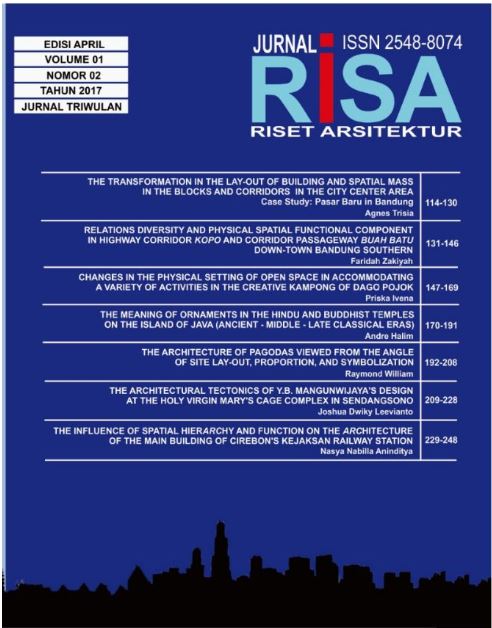THE MEANING OF ORNAMENTS IN THE HINDU AND BUDDHIST TEMPLES ON THE ISLAND OF JAVA (ANCIENT - MIDDLE - LATE CLASSICAL ERAS)
DOI:
https://doi.org/10.26593/risa.v1i02.2391.170-191Abstrak
Abstract- As one of the relics of the Classical Era, temples and shrines have been known as a means of worshipping the gods and goddesses or one’s ancestors, especially in the religions of Hinduism and Buddhism. Observers often regard the ornaments of these temples as mere visual art objects, as eye candy that may beautify their outward appearance. However, when examined more closely, these ornaments carry a certain meaning in each of the temples. The aim of this research study is to explore the deeper significance of these ornaments and their location. This research can be classified as qualitative, using the descriptive-analytical method. Employing the Purposive Sampling method regarding ornamentation, eleven temples have been selected that meet the research requirements. Both Hinduism and Buddhism have been known to make a division into three worlds, namely the lower, middle and upper spheres. This division has also shaped the elements of temples into their respective head, body and legs/feet. Further categorization yields six motifs, all of which can be found in temples in various shapes, consisting of several types of ornament that embellish the three elements mentioned above. Each of the motifs carries a variety of meanings. In this research study, the relationship between the meanings and their exact location (placement) is analyzed, indicating that they are in keeping with the division into three worlds, but then again there are ones that do not follow that pattern, and still others that are not affected at all. Development of the physical shape of the ornaments has occurred in several ornaments, but the majority of the changes in their physical shape has left no impact on the meaning contained within these ornaments.
Keywords: temple, ornament, meaning, placement, physical shape












